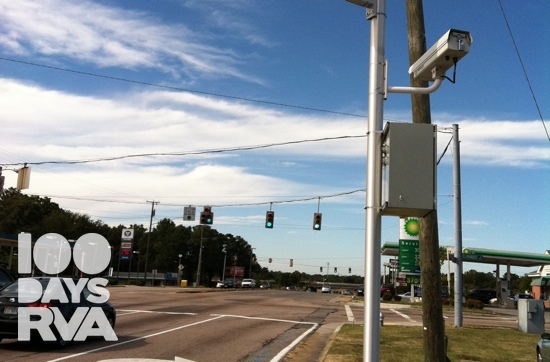Day #030: Stop generating revenue through law enforcement
When cities generate revenue through the enforcement of laws, they have an inherent incentive to up the number of fines by increasing enforcement and changing the laws.

Inspired by Michael Bierut’s 100 Day Project, 100 Days to a Better RVA strives to introduce and investigate unique ideas to improving the city of Richmond. View the entire project here and the intro here.
- Idea: Don’t privatize or generate revenue from red-light cameras.
- Difficulty: 2 — The city will have to wait for the contract to expire and our culture of road-safety will need to change.
Last December, Richmond installed its first red-light cameras at the intersection of Hull Street and Elkhardt Road. The installation came a little more than two years after signing a $4.5 million contract with Redflex Group; an Australian based traffic company.
According to state law, Richmond can legally install around 20 traffic cameras. Redflex operates at the remarkable cost of $9,480 per month per camera. The city then charges $50 per ticket per violation while hoping to generate enough revenue to pay the bills. “If there isn’t enough money raised from violations to cover a monthly payment, that remaining amount is rolled over to the following month” while extra revenue goes to the city’s general fund. Redflex has a checkered past including a bribery scandal in Chicago and receiving blame in problems with shortening yellow lights.
Tragedies and accidents happen every day. The most dangerous intersection in Richmond, Hull Street and Elkhardt Road, had 16 accidents in 2012. At $113,760 per intersection per year, that’s $7,110 per accident. That’s an expensive price to pay for limiting accidents, and that operates under the assumption that red-light cameras can significantly decrease the number of accidents. The truth is, accidents are going to happen when distracted drivers operate 2,000 pound hunks of steel at 45 mph.
If the city approached every public incident with this level of intensity then getting in the river without a lifejacket and riding bicycles without helmets would warrant significant attention from city council and heavy fines. There are plenty of genuine ways for cities to generate revenue while providing actual services for residents.1
However, when cities generate revenue through the enforcement of laws, they have an inherent incentive to up the number of fines by increasing enforcement and changing the laws–like shortening yellow lights. This behavior isn’t limited to scheming villains; it’s human nature. We should’t be surprised by the behavior of optimizing enterprises, like Redflex, seeking a competitive advantage. These firms are motivated by the same forces that motivate Chipotle to make better burritos and Apple to make better iPhones.
But if cities generate revenue through monetizing services like smart-metered parking spaces, auctioned parking spaces, fees for special services, and more ideas that will be covered during this project, then the incentives promote good business. Well-designed government services can and will behave like competitive businesses.
Privatization and contracting are powerful tools that have improved the efficiency and quality of society, but some services should be limited to government. We shouldn’t privatize our police forces, our prisons, and most definitely not our justice system. The enforcement of laws should undoubtedly be monopolized by the government.
Richmond has the brains and spirit to approach government in unorthodox ways. I implore them to approach law enforcement with the same care they approach revenue generation while not making the mistake of mixing up the two.
Love this idea? Think it’s terrible? Have one that’s ten times better? Head over to the 100 Days to a Better RVA Facebook page and join in the conversation.
photo courtesy of the Richmond Police Department
- This will be a constant theme for 100 Days to a Better RVA. Instead of punishing people through the justice system, cities can monetize unique assets over which they have monopolies while still protecting the poor and political minority. ↩
-
Recommend this
on Facebook -

Report an error
-

Subscribe to our
Weekly Digest





Notice: Comments that are not conducive to an interesting and thoughtful conversation may be removed at the editor’s discretion.
Mr. Williams is correct, traffic enforcement for profit is always wrong and inevitably leads to abuses. Red light cameras are a for-profit business partnership between the camera company and the city using them. BOTH entities have every reason to want to maximize the number of tickets and the amount of revenue.
This type of for-profit enforcement should be banned by law in every state.
James C. Walker, Life Member – National Motorists Association